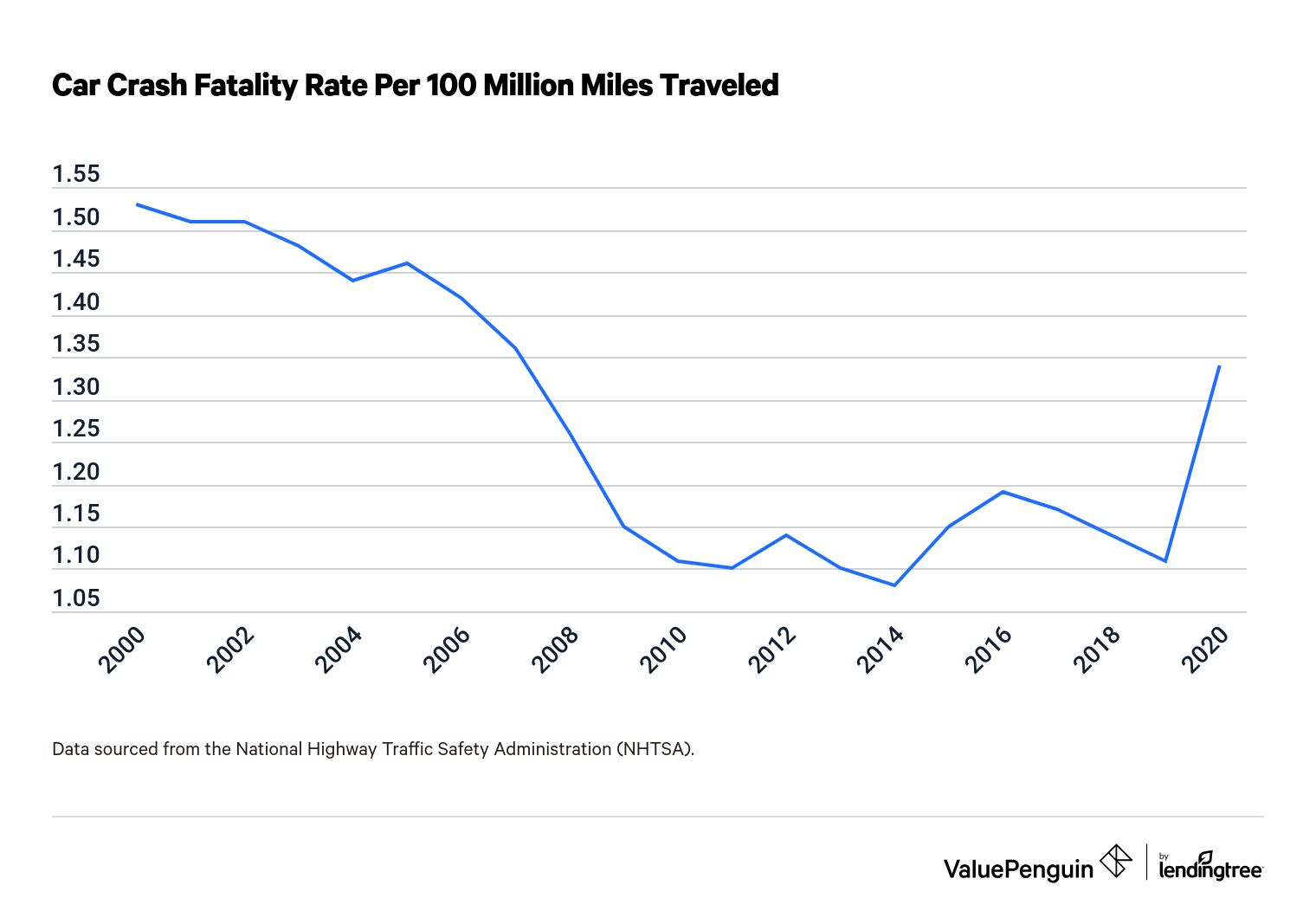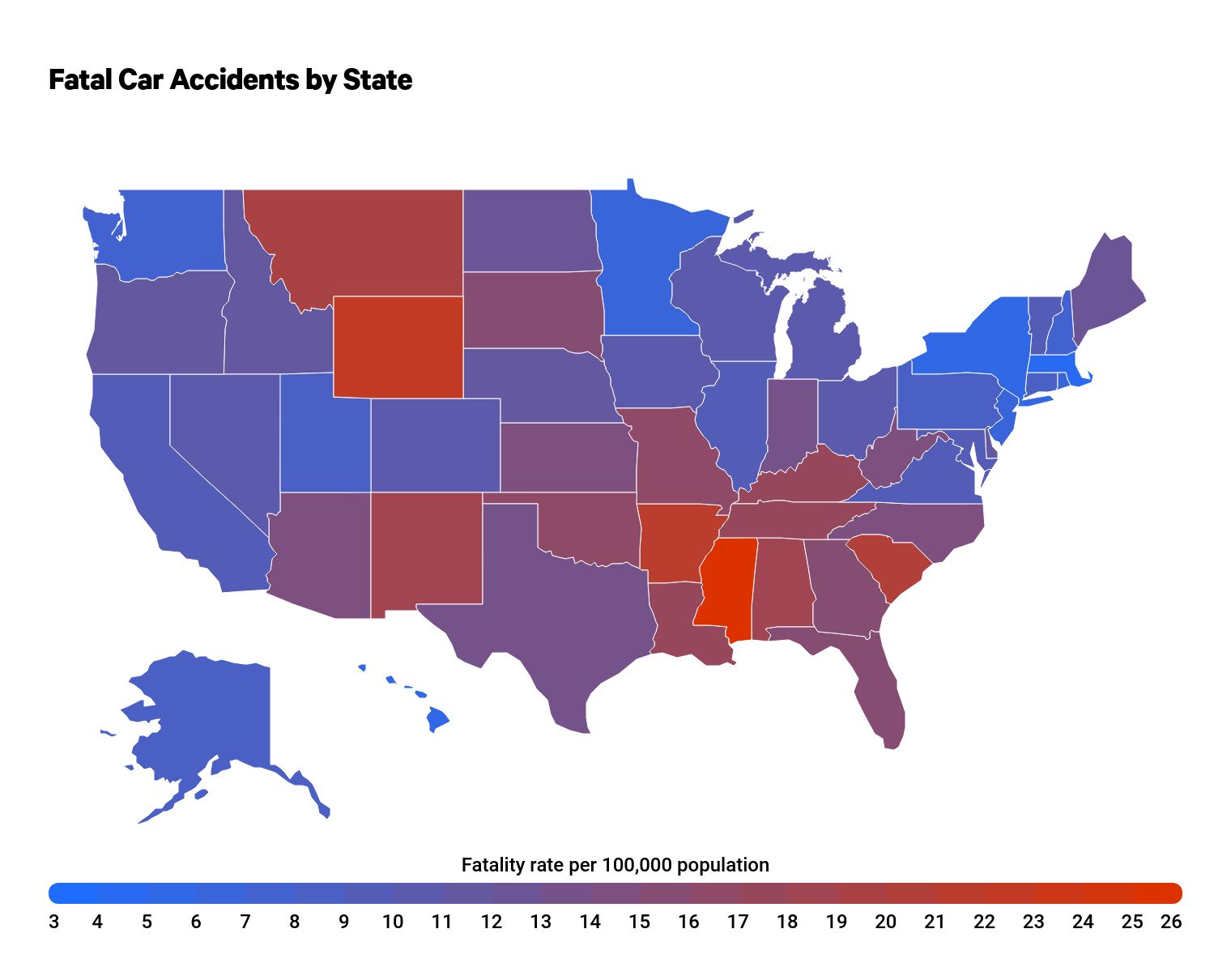Car Accident Statistics: Fatalities, Injuries and Top Risk Factors
There are over 5 million car accidents in the U.S. each year. The number of accidents decreased by 22% between 2019 and 2020, and the number of people injured per year decreased by 17% to 2.3 million. However, the number of fatal accidents per mile driven increased by 21% year over year, the largest recorded annual increase.
Car accident statistics
- There were over 5 million police-reported car accidents in the U.S. in 2020, according to the National Highway Traffic Safety Administration (NHTSA), a 22% decrease from 2019.
- A total of 38,824 traffic-related deaths resulted from 35,766 fatal accidents in 2020, which is the highest fatality count since 2007.
- 43% of car accidents resulted in injuries, which equals out to four car-accident injuries per minute.
- The state with the most fatal accidents per capita is Mississippi — there were 25 fatal crashes per 100,000 residents in 2020.
- Driving under the influence, speeding and seatbelt nonuse are the top behaviors that lead to car accident deaths.
Table of contents
Find Cheap Auto Insurance Quotes in Your Area
How many car accidents happen each year?
There were 5,250,873 police-reported car accidents in 2020, according to the NHTSA. That averages out to 14,386 accidents per day, or one crash every six minutes.
In 2020, Americans had a 1 in 63 chance of getting in a car accident.
There was a 22% decrease in car accidents between 2019 and 2020. That's not surprising given that fewer drivers were on the road during the height of the coronavirus pandemic — the total number of miles driven in 2020 was 11% less than in 2019.
How many people die in car accidents?
There were 35,766 fatal accidents in the U.S. in 2020. Those accidents resulted in 38,824 deaths, or 106 car accident deaths per day.
One out of every 147 accidents is fatal — that's 0.7%.

Although the number of total car accidents per mile driven went down in 2020, the fatality rate was the highest it's been since 2007. In fact, 2,469 more people were killed in car accidents in 2020 than in 2019.
How many people are injured in car accidents?
At least one driver or passenger is injured in 43% of car crashes. There were 2,282,015 injuries reported in 2020 — that's 6,252 per day, or four per minute.
In contrast to the fatality rate, the injury rate per mile traveled decreased by 6% from 2019 to 2020.
What are the leading causes of car crashes?
The three leading behavioral causes of fatal collisions are speeding, driving under the influence (DUI) and not using a seat belt. Deaths caused by each of those three factors increased from 2019 to 2020.
Behavior | 2020 fatalities | % change from 2019 |
|---|---|---|
| DUI | 11,654 | Up 14% |
| Speeding | 11,258 | Up 17% |
| Seat belt nonuse | 10,893 | Up 14% |
| Distracted driving | 3,142 | Up 0.7% |
| Hit-and-run | 2,564 | Up 26% |
| Drowsy | 633 | Down 9.2% |
The number of people killed in hit-and-run accidents also increased by 26%. Hit-and-run accidents represent 7% of the total number of fatalities.
Nearly 1 in 10 fatal accidents are caused by distracted driving.
Single-vehicle crashes account for more than 60% of car accident deaths, a number that increased by 9.4% from 2019 to 2020. In contrast, fatalities from multivehicle accidents increased by 3.7%.
Car accidents by vehicle type
Passenger cars, like sedans and compact cars, have the most accidents that result in injuries or death. In comparison, passenger cars only made up 19% of cars purchased in the U.S. in 2020, according to Newsweek. Pickup trucks and SUVs accounted for 40% and 41%, respectively.
Passenger car fatalities increased by 9% from 2019 to 2020. The only vehicle type with a larger increase in fatalities year over year is the motorcycle, which experienced an 11% increase.
Vehicle type | Total injuries | % injuries by vehicle | Total fatalities | % fatalities by vehicle |
|---|---|---|---|---|
| Passenger car occupants | 1,221,335 | 54% | 13,472 | 35% |
| SUV occupants | 486,652 | 21% | 5,075 | 13% |
| Pickup truck occupants | 236,264 | 10% | 4,330 | 11% |
| Van occupants | 88,724 | 4% | 933 | 2% |
| Large trucks | 44,934 | 2% | 831 | 2% |
| Motorcyclists | 82,528 | 4% | 5,579 | 14% |
| Pedestrians | 54,769 | 2% | 6,516 | 17% |
| Pedal cyclists | 38,886 | 2% | 938 | 2% |
Car accident statistics by state
Texas has the most fatal collisions of any state — 3,874 people were killed in car accidents throughout the state. However, Texas also has the second-largest population of any state.
Adjusted for population, Mississippi has the most fatal car accidents per capita at 25 crashes per 100,000 people living in the state. Massachusetts has the fewest at five per 100,000 people.
Another important factor is the number of miles driven in a state per year. South Carolina has 1.97 fatal crashes per million miles driven, the highest rate in the country. Massachusetts has the fewest fatal accidents based on mileage at 0.33 per million miles.

List of car accidents by state
State | Total deaths | Rate per 100,000 people | Rate per million miles traveled |
|---|---|---|---|
| Alabama | 934 | 18.59 | 1.38 |
| Alaska | 64 | 8.73 | 1.21 |
| Arizona | 1054 | 14.74 | 1.6 |
| Arkansas | 638 | 21.19 | 1.88 |
| California | 3847 | 9.73 | 1.28 |
Frequently asked questions
How many car accidents happen per day?
There were 14,386 car accidents per day in 2020, according to the NHTSA.
How many people die in car accidents every year?
There were 38,824 traffic-related deaths in 2020, as a result of 35,766 accidents.
How often does a car crash occur?
One accident occurs every six minutes in the U.S.
How many people die each day from texting and driving?
Accident fatalities because of texting and driving are hard to measure accurately. However, there are nine fatal car accidents every day due to distracted driving, which includes texting.
What age group has the most car accidents?
The group with the highest number of accident fatalities is 25- to 34-year-olds — they account for 20% of car accident deaths.
Methodology
Data was gathered from the following sources:
Senior Writer
Lindsay Bishop is a Senior Writer at ValuePenguin, where she educates readers about home, auto, renters, flood and motorcycle insurance.
Lindsay began her career in the insurance and financial industry in 2010. She was a licensed auto, home, life and health insurance agent and held Series 6 and 63 financial licenses.
After a hiatus from the financial sector, Lindsay returned to the industry as a content writer for ValuePenguin in 2021. She enjoys having the opportunity to help readers make smart decisions about their insurance so they can be prepared for anything life throws their way.
When Lindsay isn't writing about insurance, you can find her spending time with family, enjoying the outdoors on Sunday long runs or riding her Peloton.
How insurance helped Lindsay
As a homeowner for 15 years located in South Carolina, Lindsay has plenty of experience navigating the coastal insurance market and managing the claims process. That includes successfully negotiating a full roof replacement claim.
Expertise
- Home insurance
- Car insurance
- Flood insurance
- Renters insurance
- Motorcycle insurance
Referenced by
- CNBC
- Yahoo Finance
- Miami Herald
Education
- BS/BA Economics, University of Nevada Las Vegas
Editorial Note: The content of this article is based on the author's opinions and recommendations alone. It has not been previewed, commissioned or otherwise endorsed by any of our network partners.
